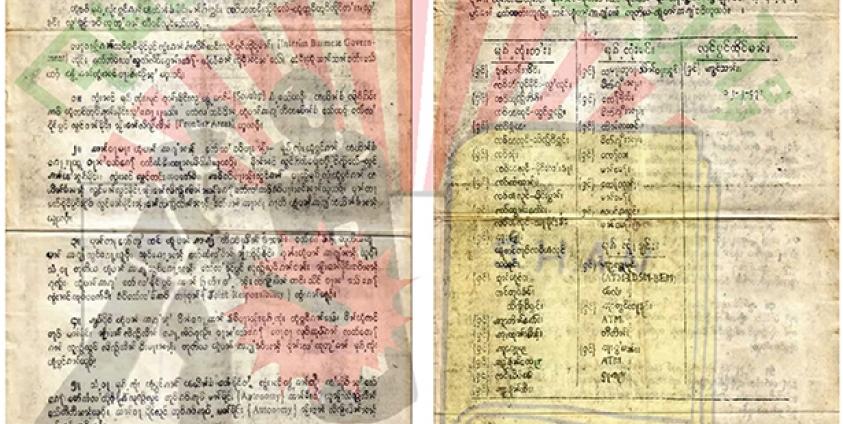Lieutenant General Yawd Serk the chairman of Restoration Council of Shan State / Shan State Army (RCSS/SSA) urged people to post up the nine points of Pang Long (Pin Lon) agreement in their homes.
He said it needed to be done because today’s Shan youth no longer know what the Pang Long agreement is or the history of Shan National Day.
He made the comment when he met people at the Pariyatti Pitaka Learning Center Monastery in Pang Long Town on the morning of 19 February.
He said: “If there is no Shan State National Day, there will be also be no Union Day. That is why the Shan State flag and Pang Long Agreement must be posted in all homes. I want them to be seen when people enter homes. The Shan State and Pang Long Agreement are symbols of Pang Long Town.”
The Pang Long Treaty guaranteed that highland and lowland dwelling ethnic nationalities would have the same rights as Bamar people. At the meeting in Pang Long to sign the treaty General Aung San, the Burmese leader, verbally promised that any ethnic state that was still unhappy could secede from the union.
Gen. Aung San’s verbal promise to allow the ethnic states the choice, if they so wished, to secede after 10 years of being in the union was later written into the 1947 Burmese constitution.
The nine points of the Panglong Agreement are as follows:
(1) A representative of the Hill peoples, selected by the Governor on the recommendation of representatives of the Supreme Council of the United Hill Peoples, shall be appointed a Counsellor to the Governor to deal with the Frontier Areas.
(2) The said Counsellor shall also be appointed a member of the Governor's Executive Council without portfolio, and the subject of Frontier Areas brought within the purview of the Executive Council by constitutional convention as in the case of Defence and External Affairs. The Counsellor for Frontier Areas shall be given executive authority by similar means.
(3) The said Counsellor shall be assisted by two Deputy Counsellors representing races of which he is not a member. While the two Deputy Counsellors should deal in the first instance with the affairs of the respective areas and the Counsellor with all the remaining parts of the Frontier Areas, they should by Constitutional Convention act on the principle of joint responsibility.
(4) While the Counsellor in his capacity of Member of the Executive Council will be the only representative of the Frontier Areas on the Council, the Deputy Counsellor(s) shall be entitled to attend meetings of the Council when subjects pertaining to the Frontier Areas are discussed.
(5) Though the Governor's Executive Council will be augmented as agreed above, it will not operate in respect of the Frontier Areas in any manner which would deprive any portion of these Areas of the autonomy which it now enjoys in internal administration. Full autonomy in internal administration for the Frontier Areas is accepted in principle.
(6) Though the question of demarcating and establishing a separate Kachin State within a Unified Burma is one which must be relegated for decision by the Constituent Assembly, it is agreed that such a State is desirable. As first step towards this end, the Counsellor for Frontier Areas and the Deputy Counsellors shall be consulted in the administration of such areas in the Myitkyina and the Bhamo District as are Part 2 Scheduled Areas under the Government of Burma Act of 1935.
(7) Citizens of the Frontier Areas shall enjoy rights and privileges which are regarded as fundamental in democratic countries.
(8) The arrangements accepted in this Agreement are without prejudice to the financial autonomy now vested in the Federated Shan States.
(9) The arrangements accepted in this Agreement are without prejudice to the financial assistance which the Kachin Hills and the Chin Hills are entitled to receive from the revenues of Burma and the Executive Council will examine with the Frontier Areas Counsellor and Deputy Counsellor(s) the feasibility of adopting for the Kachin Hills and the Chin Hills financial arrangements similar to those between Burma and the Federated Shan States.
Translated by Aung Myat Soe English version written by Mark Inkey for BNI







